Unit 10 You're supposed to shake hands.核心词汇&知识点讲练 课件(共85张PPT)
文档属性
| 名称 | Unit 10 You're supposed to shake hands.核心词汇&知识点讲练 课件(共85张PPT) |

|
|
| 格式 | pptx | ||
| 文件大小 | 3.7MB | ||
| 资源类型 | 教案 | ||
| 版本资源 | 人教新目标(Go for it)版 | ||
| 科目 | 英语 | ||
| 更新时间 | 2023-11-20 00:00:00 | ||
图片预览

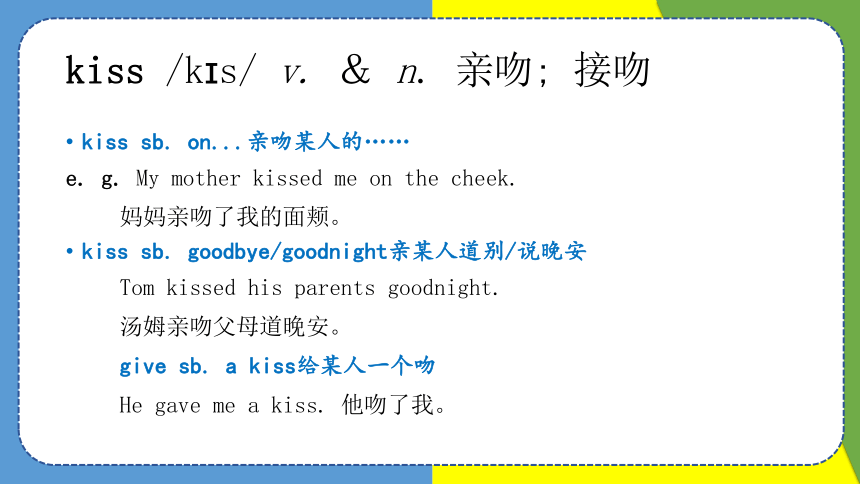
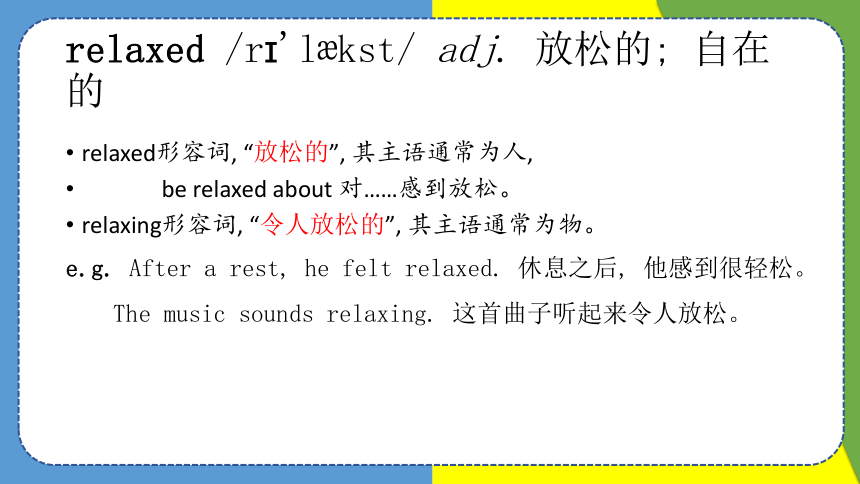
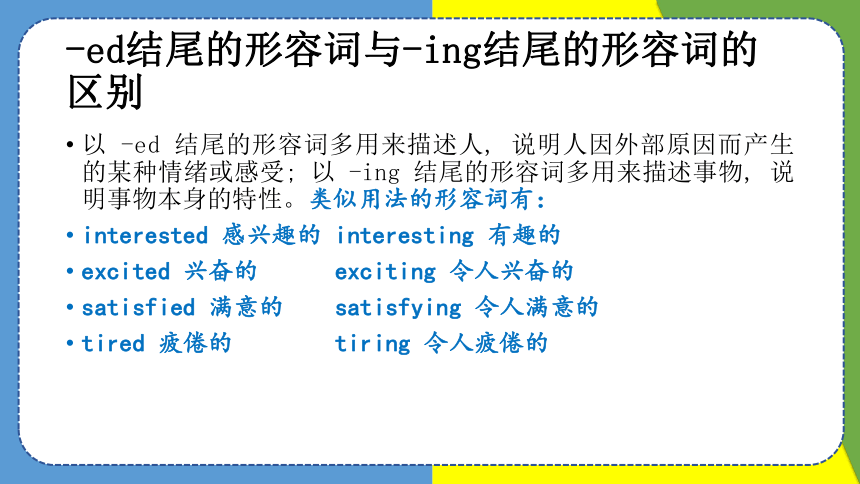
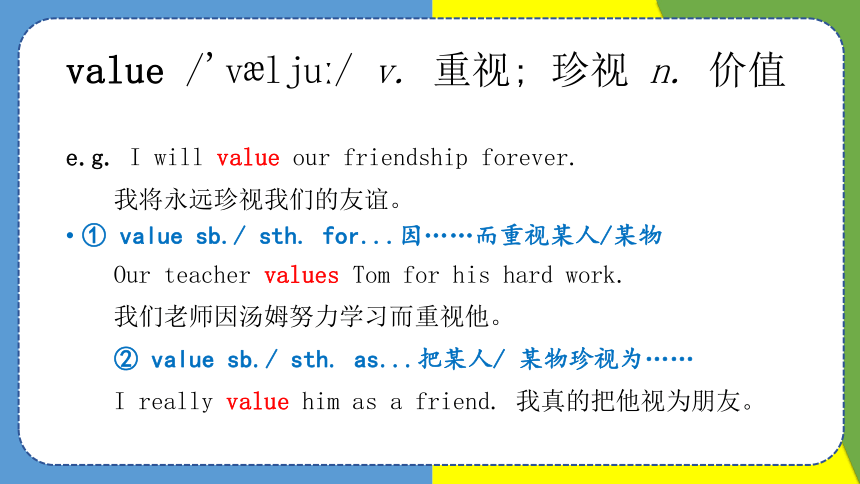
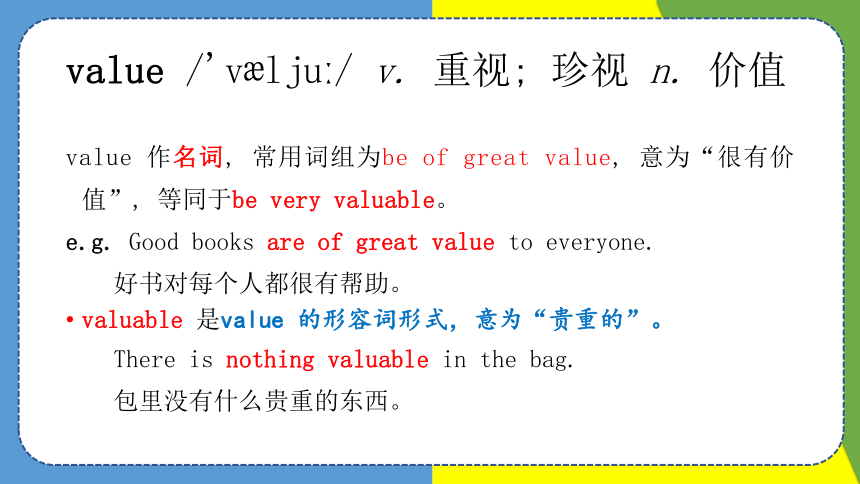
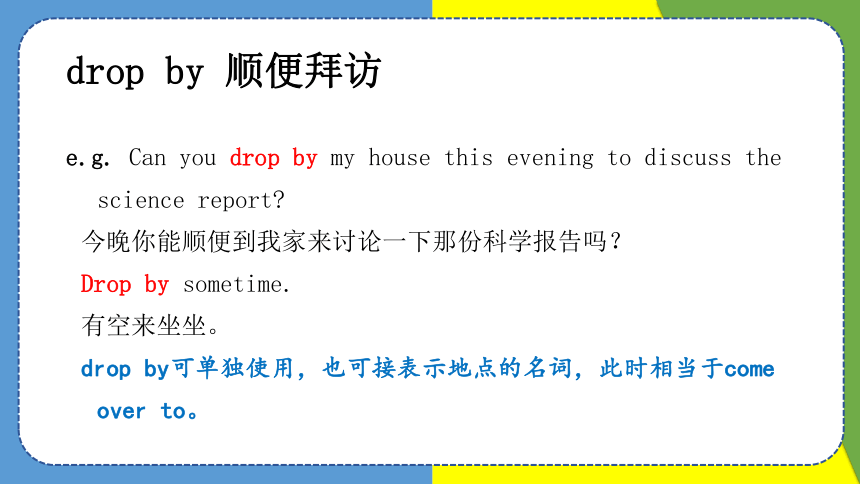
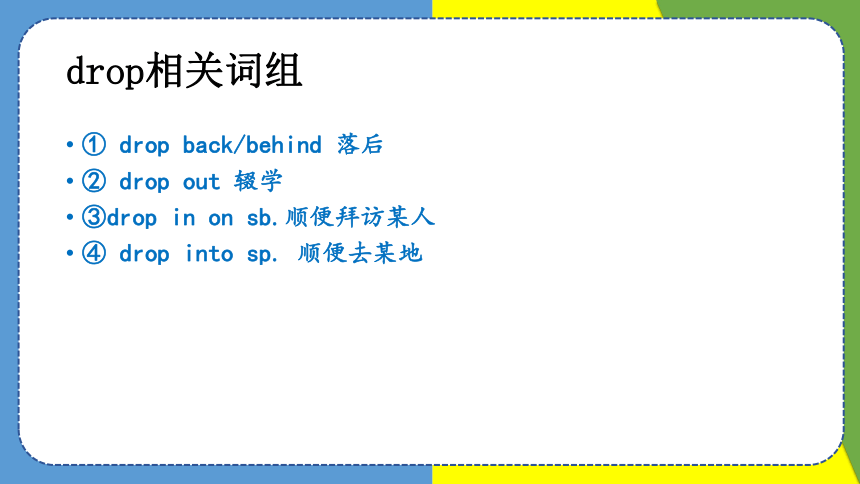
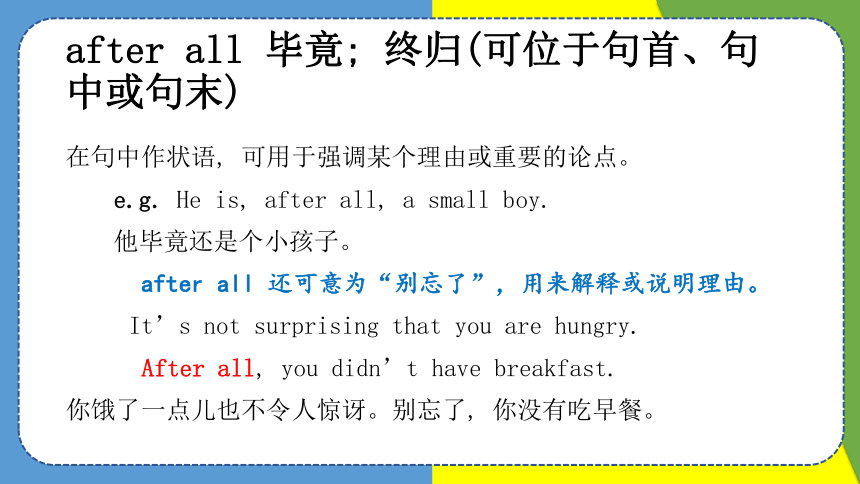
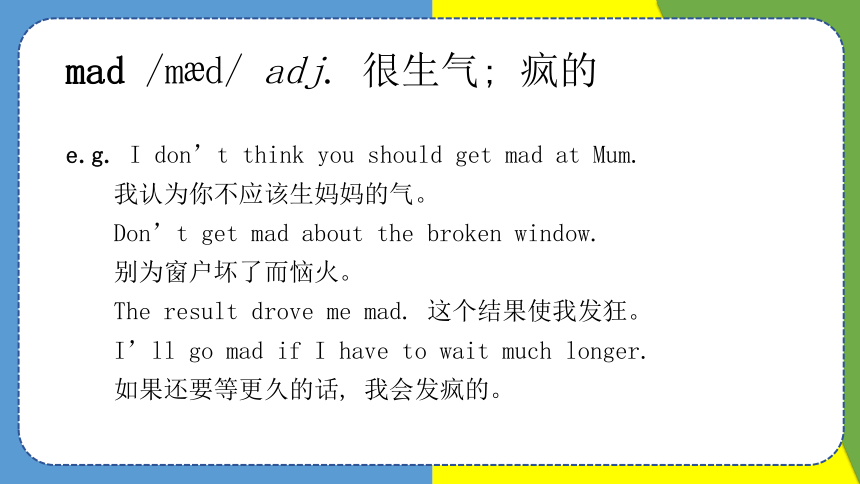
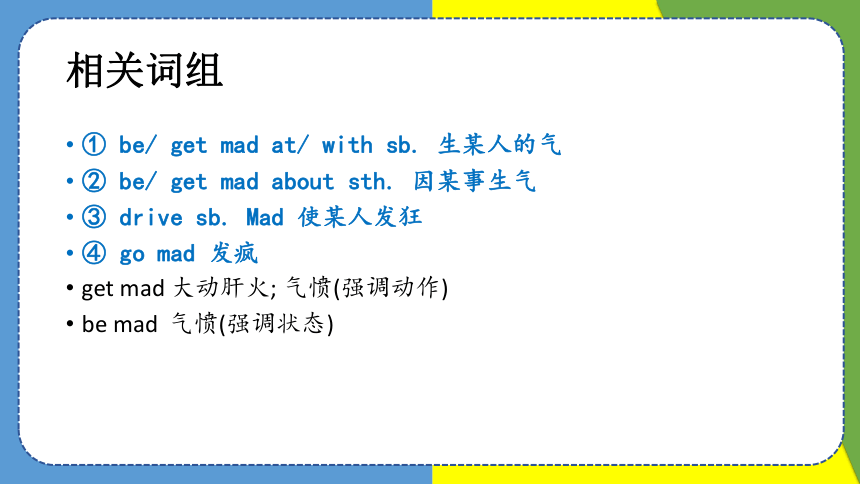
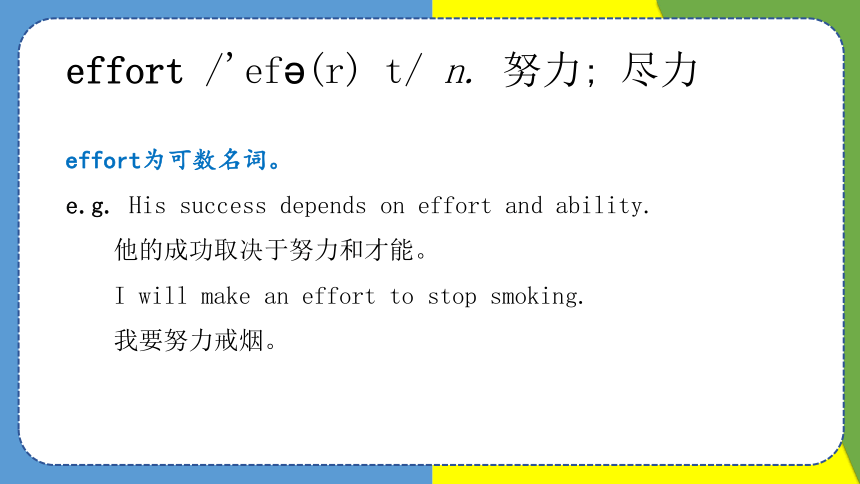
文档简介
(共85张PPT)
Unit 10
like music that I can dance to
Hi!
核心单词和知识点讲练
kiss /k s/ v. & n. 亲吻; 接吻
kiss sb. on...亲吻某人的……
e. g. My mother kissed me on the cheek.
妈妈亲吻了我的面颊。
kiss sb. goodbye/goodnight亲某人道别/说晚安
Tom kissed his parents goodnight.
汤姆亲吻父母道晚安。
give sb. a kiss给某人一个吻
He gave me a kiss. 他吻了我。
relaxed /r 'l kst/ adj. 放松的; 自在的
relaxed形容词, “放松的”, 其主语通常为人,
be relaxed about 对……感到放松。
relaxing形容词, “令人放松的”, 其主语通常为物。
e.g. After a rest, he felt relaxed. 休息之后, 他感到很轻松。
The music sounds relaxing. 这首曲子听起来令人放松。
-ed结尾的形容词与-ing结尾的形容词的区别
以 -ed 结尾的形容词多用来描述人, 说明人因外部原因而产生的某种情绪或感受; 以 -ing 结尾的形容词多用来描述事物, 说明事物本身的特性。类似用法的形容词有:
interested 感兴趣的 interesting 有趣的
excited 兴奋的 exciting 令人兴奋的
satisfied 满意的 satisfying 令人满意的
tired 疲倦的 tiring 令人疲倦的
value /'v lju / v. 重视; 珍视 n. 价值
e.g. I will value our friendship forever.
我将永远珍视我们的友谊。
① value sb./ sth. for...因……而重视某人/某物
Our teacher values Tom for his hard work.
我们老师因汤姆努力学习而重视他。
② value sb./ sth. as...把某人/ 某物珍视为……
I really value him as a friend. 我真的把他视为朋友。
value /'v lju / v. 重视; 珍视 n. 价值
value 作名词, 常用词组为be of great value, 意为“很有价值”, 等同于be very valuable。
e.g. Good books are of great value to everyone.
好书对每个人都很有帮助。
valuable 是value 的形容词形式,意为“贵重的”。
There is nothing valuable in the bag.
包里没有什么贵重的东西。
drop by 顺便拜访
e.g. Can you drop by my house this evening to discuss the science report
今晚你能顺便到我家来讨论一下那份科学报告吗?
Drop by sometime.
有空来坐坐。
drop by可单独使用,也可接表示地点的名词,此时相当于come over to。
drop相关词组
① drop back/behind 落后
② drop out 辍学
③drop in on sb.顺便拜访某人
④ drop into sp. 顺便去某地
after all 毕竟; 终归(可位于句首、句中或句末)
在句中作状语, 可用于强调某个理由或重要的论点。
e.g. He is, after all, a small boy.
他毕竟还是个小孩子。
after all 还可意为“别忘了”,用来解释或说明理由。
It’s not surprising that you are hungry.
After all, you didn’t have breakfast.
你饿了一点儿也不令人惊讶。别忘了, 你没有吃早餐。
mad /m d/ adj. 很生气; 疯的
e.g. I don’t think you should get mad at Mum.
我认为你不应该生妈妈的气。
Don’t get mad about the broken window.
别为窗户坏了而恼火。
The result drove me mad. 这个结果使我发狂。
I’ll go mad if I have to wait much longer.
如果还要等更久的话, 我会发疯的。
相关词组
① be/ get mad at/ with sb. 生某人的气
② be/ get mad about sth. 因某事生气
③ drive sb. Mad 使某人发狂
④ go mad 发疯
get mad 大动肝火; 气愤(强调动作)
be mad 气愤(强调状态)
effort /'ef (r) t/ n. 努力; 尽力
effort为可数名词。
e.g. His success depends on effort and ability.
他的成功取决于努力和才能。
I will make an effort to stop smoking.
我要努力戒烟。
effort相关词组
① put more effort into sth.更加努力做某事
② make an effort to do sth.努力做某事
③ without effort毫不费力
clean. . . off 把……擦(或刷) 掉
动副结构短语代词作宾语时要放在两者之间。
e. g. He tried to clean the mud off.
= He tried to clean off the mud.
他尽力把泥刷掉。
Look at the dirt on your shoes. Please clean it off.
看看你鞋上的灰尘, 请把它擦掉。
clean. . . off 把……擦(或刷) 掉
① clean off把……擦(或刷)掉
② clean up 把……打扫干净
③ clean out把……内部彻底打扫干净
Your room is dirty. Please clean it up.
你的房间脏了。请把它打扫干净。
You need to clean out the drawers of your desk.
你需要把你书桌的抽屉清理一下。
blackboard /'bl kb (r) d/ n. 黑板
e. g. We are supposed to clean the blackboard before class.
上课前我们应该擦黑板。
构词法记单词:
blackboard为合成词,由black(黑色)+board(板子)构成。
类似的单词还有:
bookcase 书橱 guidebook 旅行指南 highway 公路等
knock /n k/, /nɑ k/ v. 敲; 击 n. 敲击声; 敲击
e. g. You are supposed to knock at the door and wait before entering the office.
进入办公室之前你应该先敲门并等待。
knock作不及物动词,指出声地、连续地击打。knock at/ on the door意为“敲门”。
knock /n k/, /nɑ k/ v. 敲; 击 n. 敲击声; 敲击
(1) knock 作及物动词, 意为“碰; 撞”。
e. g. Be careful you don’t knock your head on this low beam.
小心别把头撞在这矮梁上。
(2) knock 还可以作可数名词, 意为“敲击声; 撞击”。
e. g. Suddenly, there was a knock on the door. 突然有敲门声。
(3) knock sb. down 撞倒某人
e. g. When I turned, I nearly knocked down the little girl behind me.
当我转身时, 差点撞倒身后的小女孩。
take off 脱下(衣服) ; (飞机等) 起飞
e. g. It’s too hot here. You’d better take off your coat.
这儿太热了, 你最好脱下你的外套。
Hurry up! The plane will take off in five minutes.
快点, 飞机五分钟后起飞。
含有off 的常用短语:
set off 出发 get off 下车
go off 开火;熄灭 put off 推迟
turn off 关上 fall off 数量减少
cut off 切除;中断 kick off 踢开
worth /w (r) θ/ adj. 值得; 有……价值 ( 的 )
worth 的主语常常是物品。worth后接动词-ing 形式时用主动形式表示被动意义。
worth 一般作表语, 其后跟动词-ing 形式或名词, 具体用法如下:
(1) be worth doing sth. 值得做某事
e. g. These books are well worth reading.
这些书非常值得读。
worth /w (r) θ/ adj. 值得; 有……价值 ( 的 )
(2) be worth + 钱 值多少钱
e. g. The ring is worth 5, 000 yuan.
这枚戒指值5, 000 元。
(3) be worth + 名词 值得……
e. g. The museum is certainly worth a visit.
这家博物馆的确值得参观。
stick /st k/ v. 粘贴; 将……刺入
stick 的过去式、过去分词均为stuck 。
v. 粘贴; 将……刺入, 常与in/into 搭配。
e. g. The glue doesn’t stick very well. 这种胶水粘不住。
I stuck the knife into the apple. 我把刀子插进苹果里。
stick to 坚持; 固守, 后接名词、代词或动名词。
e. g. We must stick to our decision.
我们必须坚持我们的决定。
stick /st k/n. 枝条; 棍
n. 枝条; 棍
e. g. They collected sticks to make a fire.
他们收集树枝来生火。
empty /'empti/ adj. 空的; 空洞的
empty 作形容词, 意为“空的”, 其反义词为full。
e. g. When I got to the classroom, it was empty.
当我到达教室的时候, 教室里空无一人。
empty 作及物动词, 意为“使倒空”, 反义词为fill。
e. g. She emptied the water out of the bottle.
她把水从瓶子里倒了出来。
basic /'be s k/ adj. 基本的; 基础的
词性变化
base n. 基础;基地;底部
basically adv .基本上;从根本上说
base A on B
=A is based on B
意为“A 以B 为基础”。
basic /‘be s k/ adj. 基本的; 基础的
例句
e. g. The family is the basic unit of society.
家庭是社会的基本单位。
He bases his novel on a true story.
=His novel is based on a true story.
他的小说以一个真实的故事为基础。
exchange / ks't e nd / n. & v. 交换
exchange 的常见用法:
exchange / ks't e nd / n. & v. 交换
change 作动词, 意为“改变; 变化”。
e. g. How can we change the world
我们怎么改变世界
go out of one’ s way 特地; 格外努力
e. g. He went out of his way to start the car, but he failed.
= He tried his best to start the car, but he failed.
他想尽一切办法来发动这辆车, 但他失败了。
He would go out of his way to help anyone in trouble.
= He would try his best to help anyone in trouble.
他愿意竭尽所能来帮助有困难的人。
way 的相关短语:
①on the way to...在去……的路上
②by the way 顺便提一下
③in this way用这种方式
④make one’s way 前进
⑤get in the way of 妨碍
⑥lose one’s way 迷路
make. . . feel at home 使 (某人) 感到宾至如归
e. g. Please sit down and make yourself feel at home.
请坐, 别拘束。
Lucy’s mother tried to make us feel at home.
露西的妈妈尽力让我们感觉像在家里一样。
make 表示“使……处于某种状态,使成为”,其宾语之后可接名词、形容词、不定式(不带 to)、过去分词、介词短语等作宾语补足语。
在主动语态中, make 后接省去to 的动词不定式, 变为被动语态时to要还原。
e. g. The boss made the workers work for ten hours a day.
老板让工人们每天工作十小时。
改为被动语态: The workers were made to work for ten hours a day.
工人们被迫每天工作十小时。
behave /b 'he v/ v. 表现(常用作不及物动词)
e. g. The children don’t know how to behave.
孩子们不知道如何表现。
She always behaves well in class.
她在课堂上总是表现得好。
behave 的词形变化:
behavior n . 举止;行为
-behaved(用于构成形容词)表现得……的
↓
well-behaved 表现好的
badly-behaved 表现差的
except / k'sept/ prep. 除……之外 conj. 除了; 只是
besides,except 与except for 的用法歌诀:
加上besides,减去 except (for)。
except 减去同一类,加 for 则要减异类。
except, besides 与 except for的区别
except, besides 与 except for的例句
e. g. He gets up early every day except Sunday.
他除了星期天之外每天都早起。
What other languages do you know besides English
除了英语之外, 你还懂其他什么语言
Your composition is quite good except for a few spelling mistakes. 除了几处拼写错误外, 你的作文相当好。
but 也可以表示“除……之外”,
but 也可以表示“除……之外”, 指不包括在内, 常和no, all, nobody等词连用, 有时可与except 互换。
e. g. Everybody was invited to the evening party but/ except me.
除了我之外, 每个人都被邀请参加那次晚会。
get used to习惯于(做) 某事
get used to 也可以说成 be used to 。
be used to (doing) sth.
be / get used to, used to, be used to 与be used for的区别
be/get used to 习惯于
后接名词、代词或动名词。be强调状态; get 强调动作。
used to过去常常后接动词原形。
be used to被用来后接动词原形。
be used for被用于后接名词或动名词。
be / get used to, used to, be used to 与be used for的例句
e. g. The air is rather thin here, but you will be used to it in time.
这里空气比较稀薄, 但你迟早会习惯的。
We are used to singing English songs.
我们习惯唱英文歌曲了。
He used to stay at home to watch TV.
他过去常常待在家里看电视。
Pens are used to write. = Pens are used for writing.
钢笔用来写字。
suggestion /s 'd est n/ n. 建议
suggestion 与advice的区别
suggestion可数名词
可直接用a, many及数词修饰。其对应的动词为suggest。
suggest doing sth. 建议做某事
advice不可数名词
不能直接用an, many 及数词修饰,其具体数量应借助于piece
来表示。对应的动词为advise。
advise sb. to do sth. 建议某人做某事
suggest /s 'd est/ v. 建议
suggest作动词,意为“建议”,后接宾语从句时,从句用虚 拟语气,即谓语动词用“should +动词原形”,其中should 可以省略。
Lily suggested that we (should ) go to swim.
莉莉建议我们去游泳。
接动词作宾语时,要用动词 -ing 形式。
He suggested going there on foot.
他建议步行去那里。
1. You are supposed to shake hands.
be supposed to do… 应该做……;被期望做……
按照规则、规律、义务或约定“应当;理应”去做某事,其中to为动词不定式符号,后接动词原形。
e.g. Every student is supposed to study hard.
You are supposed to take an umbrella.
be (am / is / are) supposed to的语意相当于should。
e.g. Sue is late for class and she is supposed to / should say sorry to the teacher.
be (am / is / are) supposed to的否定式是在be后加not,即be not supposed to,其一般疑问句是把be提至主语前。
e.g. You are supposed to do that.
You are not supposed to do that.
Are you supposed to do that
was / were supposed to:本应该,常用来把本应该发生的事与实际发生的事进行对照。
e.g. The meeting was supposed to take place on Tuesday, but we’ve put it off.
【语境应用】完成句子,每空一词。
1) 青少年应该敢于质疑。
Teenagers are __________ __________ be brave enough to ask questions.
2) 我们应该帮助父母做家务。
We are supposed __________ __________ our parents do the housework.
supposed to
to help
3) 火车本应该半小时前到达。
The train __________ __________ __________ arrive half an hour ago.
4) 人们不应该到处扔垃圾。
People __________ __________ __________ __________ throw rubbish everywhere.
was supposed to
are not supposed to
2. That’s how people in Japan are expected to greet each other.
greet =to welcome or say “hello”
v. 问候,打招呼
e.g. What did some ancient Chinese people do to greet others before the Spring Festival
【语境应用】翻译句子。
1) 他向她打招呼说 “早上好”。
_______________________________________
2) 她向我微笑致意。
_____________________________________________
He greeted her by saying “good morning”.
She greeted me with a friendly smile.
be expected to 有望做某事;被期待做某事
【语境应用】翻译句子。
1) 约翰应该会出席今晚的宴会。
___________________________________________________
2) 借阅者被要求准时还书。
_______________________________________________
John is expected to come to the party tonight.
Borrowers are expected to return books on time.
3. I held out my hand and to my surprise, she kissed me on both sides of my face!
to one’s surprise 令某人惊讶的是,在句中作状语,常位于句首。
e.g. To my surprise, they said okay. (翻译)
令我惊讶的是,他们说可以。
kiss sb. on…= give sb. a kiss on…亲吻某人的……
e.g. She kissed the child on the forehead.
=She gave the child a kiss on the forehead.
1. Where I’m from, we are pretty relaxed about time.
在我们那个地方,我们的时间观念比较随意。
where用作连词,引导地点状语从句,说明主句行为发生的地点。
e.g. Remember to keep the kids where you can see them. (翻译)
记住让孩子们待在你能看得见的地方。
relaxed adj. 放松的,自在的
be relaxed about … 对……感到放松
e.g. 不要害怕,轻松面试。
Don’t be afraid, just be relaxed about the interview.
4. Mind your manners!
mind…注意……; 当心;小心……
警示句型。
e.g. Mind your head, please.
小心碰头。
v. 介意,常用于否定句和疑问句,后接名词(短语)、代词、动词-ing形式或从句。
【语境应用】单项选择。
1) I don’t _______ the heat, for I’m used to hot weather.
A. like B. mind C. know D. stand
B
2) I wouldn’t mind _____ a roommate. We can help each other and save money as well.
A. having B. to have C. have D. had
A
5. manners n. 礼貌;规矩;礼仪;方式。
e.g. 满嘴食物说话是不礼貌的行为。(翻译)
It’s bad manners to talk with your mouth full.
6. relaxed, relaxing
词条 相同点 不同点
relaxed 在句子中都可作表语和定语。 放松的,轻松的,描述人的感受;修饰事物时,表示舒适的;随意的
relaxing 令人放松的;轻松的。常用来形容事物的特征。
【语境应用】根据句意,选用relaxed或relaxing填空。
1) I felt ________ lying in the sun.
2) Sam’s family rules are ________.
3) I think swimming is ________. I like it very much.
relaxed
relaxed
relaxing
7. We value the time we spend with our family and friends in our everyday lives.
我们珍惜平日生活中和家人、朋友在一起的时光。
value n. 价值;用途 go up/rise in value升值;go down/fall in value 贬值;
be of value 有价值;有用;
be of little/no value 毫无帮助
v. 重视;珍视
value ... as ... 把……视为
value ... for ... 因……而受到重视
【语境应用】完成句子。
1) 我认为每一次经历都有价值。
I think every experience _______ _______ _______.
2) 我真的把她视为我最好的朋友。
I really _______ her _______ my best friend.
3) 她因为才气而受到重视。
She _______ _______ _______ her talents.
is of value
value as
is valued for
life n. 生活(可数名词)
e.g. Many people make different kinds of friends in their social lives.
许多人在他们的社交生活中结交了各种不同的朋友。
live/ have/ lead a …life 过……的生活
e.g. She just wanted to live a quiet life.
她只想过平静的生活。
8. We often just drop by our friends’ homes if we have time.
drop by 顺便拜访,+表示地点的名词。
e.g. 今晚请到我家来谈谈。(翻译)
Please drop by my home this evening.
drop in顺便拜访,+人时,用介词on,+地点时,要用介词at。
e.g. I just drop in on him for a chat. (翻译)
我只是顺便来和他聊聊天。
I dropped in at Tom’s house on my way to the club.(翻译)
我去俱乐部的路上顺便去了Tom家。
visit, drop in
词条 相同点 不同点
visit 都有“拜访”的意思 表示逗留时间较长的、较正式的访问或友好往来,后面的宾语可以是人也可以是地点。
drop in 表示顺便来访、非正式的访问,是不及物短语动词,后面接表示人的宾语时要用 drop in on,后面接表示地点的宾语时要用drop in at。
【语境应用】根据句意用visit或drop in的适当形式填空。
1) I plan to ______________ Shanghai next year.
2) Uncle Lee often ______________ at our house for tea.
visit
drops in
10. In Switzerland, it’s very important to be on time.
It’s + adj.+ to do sth. 做某事是……的。
it作形式主语,真正的主语是不定式短语to do sth.。
e.g. It’s necessary to eat healthy food.(翻译)
吃健康的食物是很有必要的。
【语境应用】汉译英。
1) 住在这样一个现代化的城市里很舒适。
_______________________________________________
2) 独自在河里游泳是危险的。
________________________________________________
It’s comfortable to live in such a modern city.
It’s dangerous to swim alone in the river.
11. We’re the capital of clocks and watches, after all!
after all 不管怎样,毕竟,用来提示或强调可能被忽略的事实。
e.g. So you see, I was right after all.
你看, 毕竟还是我对吧。
You decided to come after all.
毕竟你还是决定来了。
【语境应用】将下面的汉语句子翻译为英语。
别生那个男孩的气了。毕竟,他才6岁。
_____________________________________________________
Don’t be angry with the boy. After all, he’s only 6 years old.
12. So I make an effort to be on time when I meet my friends.
make an effort to do sth. 作出努力
e.g. 我要尽力戒烟。
I will make an effort to stop smoking.
你应该努力提高你的阅读能力。
You should make an effort to improve your reading ability.
13. Also, we never visit a friend’s house without calling first.
双重否定句。never和without都表示否定,合在一起表达肯定意义。
e.g. You will hardly ever be able to speak good English without practicing.
你不练习几乎是不可能把英语说好的。
14. I was a bit nervous before I arrived here, but there was no reason to be.
reason to do sth. 做某事的理由
no reason to do sth. 没有理由做……
e.g. You have no reason to be nervous.
The police have reason to believe that he is guilty (有罪). (翻译)
你没有理由这么紧张。
警方有理由认定他有罪。
15. They go out of their way to make me feel at home.
go out of one’s way 竭尽全力地
e.g. They go out of their way to serve all the passengers. (翻译)
他们想方设法为全体乘客服务。
make sb. feel at home
使某人感到宾至如归
e.g. The warm atmosphere (气氛) made the customers feel at home. (翻译)
这种温馨的气氛让顾客宾至如归。
16. You wouldn’t believe how quickly my French has improved because of that.
You wouldn’t believe… 你无法想象……;你想都想不到……;你绝不会相信……
表示所陈述的事情超出想象之外。类似表达还有You would never believe…或You would hardly believe…。
【语境应用】翻译句子。
1) 你绝对想不到他在四川找到了失散多年的姐姐(long-lost sister)!
You wouldn’t believe that he found his long-lost sister in Sichuan!
2) 你根本无法想象,自从他听了您的讲课后进步有多大。
You would never believe what quick progress he’s made ever since he attended your class.
17. My biggest challenge is learning how to behave at the dinner table.
learning how to behave at the table: 现在分词短语,作句子表语。
e.g. The most important thing is getting there in time. (翻译)
最重要的事是及时到达那里。
behave vi. 表现;行为
behave well / badly 表现好/糟糕
behave as if / as though 表现得好像……
behave + adv. + towards / to sb.
以……方式对待某人
behave oneself 表现得体;有礼貌
e.g. The boy behaved very well last night.
Bruce was a little boy, but he behaved as if / as though he was an adult.
I think he behaved badly towards / to you that day.
I hope Nicholas behaved himself at the party.
【语境应用】完成句子。
1) 他们从不互相问候,表现得像陌生人。
They never greeted each other and ____________________ they were strangers.
2) 除非你表现得体,否则就不会得到任何礼物。
Unless you ________________, you won’t get any present.
behave yourself
behaved as if/as though
18. Another example is that you’re not supposed to eat anything with your hands except bread, not even fruit.
except prep. 除……之外。后跟名词(短语)、代词、介词短语等,强调被除去的部分不包括在整体中,常与all, every, no, nothing等含有整体意义的词连用。
besides 也可以表示“除……之外”,强调被除去的部分包括在句子所表述的情况之内,表示一种相加关系。
besides, except
1) All the students in my class can speak Chinese ________ Tim.
2) ________ Linda, five other girls went camping.
3) Everyone went to the park ________ Tom.
4) Do you play any other sports ________ football and basketball
【语境应用】选词填空。
except
Besides
except
besides
19. … but I’m gradually getting used to it.
get used to sth./doing sth.
=be used to doing sth. 习惯于做某事
to在这里是介词,后接名词、代词或动词-ing形式。
e.g. We get used to this way of speaking. (翻译)
我们习惯了这种说话方式。
be/get used to sth./doing sth. 习惯于……
used to do sth. 过去常常干某事(现在不了),to在这里是不定式符号,后接动词原形。
e.g. 他习惯住在乡下。
他过去常常种植玫瑰。 (翻译)
He got used to living in the country.
He used to plant roses.
be/get used to sth./doing sth. & used to do sth.
【语境应用】选用get / be used to或used to填空,每空词数不限。
1) We have _______________ the life in London.
2) Philip _______________ walk in the park in the morning.
got / been used to
used to
Unit 10
like music that I can dance to
Hi!
核心单词和知识点讲练
kiss /k s/ v. & n. 亲吻; 接吻
kiss sb. on...亲吻某人的……
e. g. My mother kissed me on the cheek.
妈妈亲吻了我的面颊。
kiss sb. goodbye/goodnight亲某人道别/说晚安
Tom kissed his parents goodnight.
汤姆亲吻父母道晚安。
give sb. a kiss给某人一个吻
He gave me a kiss. 他吻了我。
relaxed /r 'l kst/ adj. 放松的; 自在的
relaxed形容词, “放松的”, 其主语通常为人,
be relaxed about 对……感到放松。
relaxing形容词, “令人放松的”, 其主语通常为物。
e.g. After a rest, he felt relaxed. 休息之后, 他感到很轻松。
The music sounds relaxing. 这首曲子听起来令人放松。
-ed结尾的形容词与-ing结尾的形容词的区别
以 -ed 结尾的形容词多用来描述人, 说明人因外部原因而产生的某种情绪或感受; 以 -ing 结尾的形容词多用来描述事物, 说明事物本身的特性。类似用法的形容词有:
interested 感兴趣的 interesting 有趣的
excited 兴奋的 exciting 令人兴奋的
satisfied 满意的 satisfying 令人满意的
tired 疲倦的 tiring 令人疲倦的
value /'v lju / v. 重视; 珍视 n. 价值
e.g. I will value our friendship forever.
我将永远珍视我们的友谊。
① value sb./ sth. for...因……而重视某人/某物
Our teacher values Tom for his hard work.
我们老师因汤姆努力学习而重视他。
② value sb./ sth. as...把某人/ 某物珍视为……
I really value him as a friend. 我真的把他视为朋友。
value /'v lju / v. 重视; 珍视 n. 价值
value 作名词, 常用词组为be of great value, 意为“很有价值”, 等同于be very valuable。
e.g. Good books are of great value to everyone.
好书对每个人都很有帮助。
valuable 是value 的形容词形式,意为“贵重的”。
There is nothing valuable in the bag.
包里没有什么贵重的东西。
drop by 顺便拜访
e.g. Can you drop by my house this evening to discuss the science report
今晚你能顺便到我家来讨论一下那份科学报告吗?
Drop by sometime.
有空来坐坐。
drop by可单独使用,也可接表示地点的名词,此时相当于come over to。
drop相关词组
① drop back/behind 落后
② drop out 辍学
③drop in on sb.顺便拜访某人
④ drop into sp. 顺便去某地
after all 毕竟; 终归(可位于句首、句中或句末)
在句中作状语, 可用于强调某个理由或重要的论点。
e.g. He is, after all, a small boy.
他毕竟还是个小孩子。
after all 还可意为“别忘了”,用来解释或说明理由。
It’s not surprising that you are hungry.
After all, you didn’t have breakfast.
你饿了一点儿也不令人惊讶。别忘了, 你没有吃早餐。
mad /m d/ adj. 很生气; 疯的
e.g. I don’t think you should get mad at Mum.
我认为你不应该生妈妈的气。
Don’t get mad about the broken window.
别为窗户坏了而恼火。
The result drove me mad. 这个结果使我发狂。
I’ll go mad if I have to wait much longer.
如果还要等更久的话, 我会发疯的。
相关词组
① be/ get mad at/ with sb. 生某人的气
② be/ get mad about sth. 因某事生气
③ drive sb. Mad 使某人发狂
④ go mad 发疯
get mad 大动肝火; 气愤(强调动作)
be mad 气愤(强调状态)
effort /'ef (r) t/ n. 努力; 尽力
effort为可数名词。
e.g. His success depends on effort and ability.
他的成功取决于努力和才能。
I will make an effort to stop smoking.
我要努力戒烟。
effort相关词组
① put more effort into sth.更加努力做某事
② make an effort to do sth.努力做某事
③ without effort毫不费力
clean. . . off 把……擦(或刷) 掉
动副结构短语代词作宾语时要放在两者之间。
e. g. He tried to clean the mud off.
= He tried to clean off the mud.
他尽力把泥刷掉。
Look at the dirt on your shoes. Please clean it off.
看看你鞋上的灰尘, 请把它擦掉。
clean. . . off 把……擦(或刷) 掉
① clean off把……擦(或刷)掉
② clean up 把……打扫干净
③ clean out把……内部彻底打扫干净
Your room is dirty. Please clean it up.
你的房间脏了。请把它打扫干净。
You need to clean out the drawers of your desk.
你需要把你书桌的抽屉清理一下。
blackboard /'bl kb (r) d/ n. 黑板
e. g. We are supposed to clean the blackboard before class.
上课前我们应该擦黑板。
构词法记单词:
blackboard为合成词,由black(黑色)+board(板子)构成。
类似的单词还有:
bookcase 书橱 guidebook 旅行指南 highway 公路等
knock /n k/, /nɑ k/ v. 敲; 击 n. 敲击声; 敲击
e. g. You are supposed to knock at the door and wait before entering the office.
进入办公室之前你应该先敲门并等待。
knock作不及物动词,指出声地、连续地击打。knock at/ on the door意为“敲门”。
knock /n k/, /nɑ k/ v. 敲; 击 n. 敲击声; 敲击
(1) knock 作及物动词, 意为“碰; 撞”。
e. g. Be careful you don’t knock your head on this low beam.
小心别把头撞在这矮梁上。
(2) knock 还可以作可数名词, 意为“敲击声; 撞击”。
e. g. Suddenly, there was a knock on the door. 突然有敲门声。
(3) knock sb. down 撞倒某人
e. g. When I turned, I nearly knocked down the little girl behind me.
当我转身时, 差点撞倒身后的小女孩。
take off 脱下(衣服) ; (飞机等) 起飞
e. g. It’s too hot here. You’d better take off your coat.
这儿太热了, 你最好脱下你的外套。
Hurry up! The plane will take off in five minutes.
快点, 飞机五分钟后起飞。
含有off 的常用短语:
set off 出发 get off 下车
go off 开火;熄灭 put off 推迟
turn off 关上 fall off 数量减少
cut off 切除;中断 kick off 踢开
worth /w (r) θ/ adj. 值得; 有……价值 ( 的 )
worth 的主语常常是物品。worth后接动词-ing 形式时用主动形式表示被动意义。
worth 一般作表语, 其后跟动词-ing 形式或名词, 具体用法如下:
(1) be worth doing sth. 值得做某事
e. g. These books are well worth reading.
这些书非常值得读。
worth /w (r) θ/ adj. 值得; 有……价值 ( 的 )
(2) be worth + 钱 值多少钱
e. g. The ring is worth 5, 000 yuan.
这枚戒指值5, 000 元。
(3) be worth + 名词 值得……
e. g. The museum is certainly worth a visit.
这家博物馆的确值得参观。
stick /st k/ v. 粘贴; 将……刺入
stick 的过去式、过去分词均为stuck 。
v. 粘贴; 将……刺入, 常与in/into 搭配。
e. g. The glue doesn’t stick very well. 这种胶水粘不住。
I stuck the knife into the apple. 我把刀子插进苹果里。
stick to 坚持; 固守, 后接名词、代词或动名词。
e. g. We must stick to our decision.
我们必须坚持我们的决定。
stick /st k/n. 枝条; 棍
n. 枝条; 棍
e. g. They collected sticks to make a fire.
他们收集树枝来生火。
empty /'empti/ adj. 空的; 空洞的
empty 作形容词, 意为“空的”, 其反义词为full。
e. g. When I got to the classroom, it was empty.
当我到达教室的时候, 教室里空无一人。
empty 作及物动词, 意为“使倒空”, 反义词为fill。
e. g. She emptied the water out of the bottle.
她把水从瓶子里倒了出来。
basic /'be s k/ adj. 基本的; 基础的
词性变化
base n. 基础;基地;底部
basically adv .基本上;从根本上说
base A on B
=A is based on B
意为“A 以B 为基础”。
basic /‘be s k/ adj. 基本的; 基础的
例句
e. g. The family is the basic unit of society.
家庭是社会的基本单位。
He bases his novel on a true story.
=His novel is based on a true story.
他的小说以一个真实的故事为基础。
exchange / ks't e nd / n. & v. 交换
exchange 的常见用法:
exchange / ks't e nd / n. & v. 交换
change 作动词, 意为“改变; 变化”。
e. g. How can we change the world
我们怎么改变世界
go out of one’ s way 特地; 格外努力
e. g. He went out of his way to start the car, but he failed.
= He tried his best to start the car, but he failed.
他想尽一切办法来发动这辆车, 但他失败了。
He would go out of his way to help anyone in trouble.
= He would try his best to help anyone in trouble.
他愿意竭尽所能来帮助有困难的人。
way 的相关短语:
①on the way to...在去……的路上
②by the way 顺便提一下
③in this way用这种方式
④make one’s way 前进
⑤get in the way of 妨碍
⑥lose one’s way 迷路
make. . . feel at home 使 (某人) 感到宾至如归
e. g. Please sit down and make yourself feel at home.
请坐, 别拘束。
Lucy’s mother tried to make us feel at home.
露西的妈妈尽力让我们感觉像在家里一样。
make 表示“使……处于某种状态,使成为”,其宾语之后可接名词、形容词、不定式(不带 to)、过去分词、介词短语等作宾语补足语。
在主动语态中, make 后接省去to 的动词不定式, 变为被动语态时to要还原。
e. g. The boss made the workers work for ten hours a day.
老板让工人们每天工作十小时。
改为被动语态: The workers were made to work for ten hours a day.
工人们被迫每天工作十小时。
behave /b 'he v/ v. 表现(常用作不及物动词)
e. g. The children don’t know how to behave.
孩子们不知道如何表现。
She always behaves well in class.
她在课堂上总是表现得好。
behave 的词形变化:
behavior n . 举止;行为
-behaved(用于构成形容词)表现得……的
↓
well-behaved 表现好的
badly-behaved 表现差的
except / k'sept/ prep. 除……之外 conj. 除了; 只是
besides,except 与except for 的用法歌诀:
加上besides,减去 except (for)。
except 减去同一类,加 for 则要减异类。
except, besides 与 except for的区别
except, besides 与 except for的例句
e. g. He gets up early every day except Sunday.
他除了星期天之外每天都早起。
What other languages do you know besides English
除了英语之外, 你还懂其他什么语言
Your composition is quite good except for a few spelling mistakes. 除了几处拼写错误外, 你的作文相当好。
but 也可以表示“除……之外”,
but 也可以表示“除……之外”, 指不包括在内, 常和no, all, nobody等词连用, 有时可与except 互换。
e. g. Everybody was invited to the evening party but/ except me.
除了我之外, 每个人都被邀请参加那次晚会。
get used to习惯于(做) 某事
get used to 也可以说成 be used to 。
be used to (doing) sth.
be / get used to, used to, be used to 与be used for的区别
be/get used to 习惯于
后接名词、代词或动名词。be强调状态; get 强调动作。
used to过去常常后接动词原形。
be used to被用来后接动词原形。
be used for被用于后接名词或动名词。
be / get used to, used to, be used to 与be used for的例句
e. g. The air is rather thin here, but you will be used to it in time.
这里空气比较稀薄, 但你迟早会习惯的。
We are used to singing English songs.
我们习惯唱英文歌曲了。
He used to stay at home to watch TV.
他过去常常待在家里看电视。
Pens are used to write. = Pens are used for writing.
钢笔用来写字。
suggestion /s 'd est n/ n. 建议
suggestion 与advice的区别
suggestion可数名词
可直接用a, many及数词修饰。其对应的动词为suggest。
suggest doing sth. 建议做某事
advice不可数名词
不能直接用an, many 及数词修饰,其具体数量应借助于piece
来表示。对应的动词为advise。
advise sb. to do sth. 建议某人做某事
suggest /s 'd est/ v. 建议
suggest作动词,意为“建议”,后接宾语从句时,从句用虚 拟语气,即谓语动词用“should +动词原形”,其中should 可以省略。
Lily suggested that we (should ) go to swim.
莉莉建议我们去游泳。
接动词作宾语时,要用动词 -ing 形式。
He suggested going there on foot.
他建议步行去那里。
1. You are supposed to shake hands.
be supposed to do… 应该做……;被期望做……
按照规则、规律、义务或约定“应当;理应”去做某事,其中to为动词不定式符号,后接动词原形。
e.g. Every student is supposed to study hard.
You are supposed to take an umbrella.
be (am / is / are) supposed to的语意相当于should。
e.g. Sue is late for class and she is supposed to / should say sorry to the teacher.
be (am / is / are) supposed to的否定式是在be后加not,即be not supposed to,其一般疑问句是把be提至主语前。
e.g. You are supposed to do that.
You are not supposed to do that.
Are you supposed to do that
was / were supposed to:本应该,常用来把本应该发生的事与实际发生的事进行对照。
e.g. The meeting was supposed to take place on Tuesday, but we’ve put it off.
【语境应用】完成句子,每空一词。
1) 青少年应该敢于质疑。
Teenagers are __________ __________ be brave enough to ask questions.
2) 我们应该帮助父母做家务。
We are supposed __________ __________ our parents do the housework.
supposed to
to help
3) 火车本应该半小时前到达。
The train __________ __________ __________ arrive half an hour ago.
4) 人们不应该到处扔垃圾。
People __________ __________ __________ __________ throw rubbish everywhere.
was supposed to
are not supposed to
2. That’s how people in Japan are expected to greet each other.
greet =to welcome or say “hello”
v. 问候,打招呼
e.g. What did some ancient Chinese people do to greet others before the Spring Festival
【语境应用】翻译句子。
1) 他向她打招呼说 “早上好”。
_______________________________________
2) 她向我微笑致意。
_____________________________________________
He greeted her by saying “good morning”.
She greeted me with a friendly smile.
be expected to 有望做某事;被期待做某事
【语境应用】翻译句子。
1) 约翰应该会出席今晚的宴会。
___________________________________________________
2) 借阅者被要求准时还书。
_______________________________________________
John is expected to come to the party tonight.
Borrowers are expected to return books on time.
3. I held out my hand and to my surprise, she kissed me on both sides of my face!
to one’s surprise 令某人惊讶的是,在句中作状语,常位于句首。
e.g. To my surprise, they said okay. (翻译)
令我惊讶的是,他们说可以。
kiss sb. on…= give sb. a kiss on…亲吻某人的……
e.g. She kissed the child on the forehead.
=She gave the child a kiss on the forehead.
1. Where I’m from, we are pretty relaxed about time.
在我们那个地方,我们的时间观念比较随意。
where用作连词,引导地点状语从句,说明主句行为发生的地点。
e.g. Remember to keep the kids where you can see them. (翻译)
记住让孩子们待在你能看得见的地方。
relaxed adj. 放松的,自在的
be relaxed about … 对……感到放松
e.g. 不要害怕,轻松面试。
Don’t be afraid, just be relaxed about the interview.
4. Mind your manners!
mind…注意……; 当心;小心……
警示句型。
e.g. Mind your head, please.
小心碰头。
v. 介意,常用于否定句和疑问句,后接名词(短语)、代词、动词-ing形式或从句。
【语境应用】单项选择。
1) I don’t _______ the heat, for I’m used to hot weather.
A. like B. mind C. know D. stand
B
2) I wouldn’t mind _____ a roommate. We can help each other and save money as well.
A. having B. to have C. have D. had
A
5. manners n. 礼貌;规矩;礼仪;方式。
e.g. 满嘴食物说话是不礼貌的行为。(翻译)
It’s bad manners to talk with your mouth full.
6. relaxed, relaxing
词条 相同点 不同点
relaxed 在句子中都可作表语和定语。 放松的,轻松的,描述人的感受;修饰事物时,表示舒适的;随意的
relaxing 令人放松的;轻松的。常用来形容事物的特征。
【语境应用】根据句意,选用relaxed或relaxing填空。
1) I felt ________ lying in the sun.
2) Sam’s family rules are ________.
3) I think swimming is ________. I like it very much.
relaxed
relaxed
relaxing
7. We value the time we spend with our family and friends in our everyday lives.
我们珍惜平日生活中和家人、朋友在一起的时光。
value n. 价值;用途 go up/rise in value升值;go down/fall in value 贬值;
be of value 有价值;有用;
be of little/no value 毫无帮助
v. 重视;珍视
value ... as ... 把……视为
value ... for ... 因……而受到重视
【语境应用】完成句子。
1) 我认为每一次经历都有价值。
I think every experience _______ _______ _______.
2) 我真的把她视为我最好的朋友。
I really _______ her _______ my best friend.
3) 她因为才气而受到重视。
She _______ _______ _______ her talents.
is of value
value as
is valued for
life n. 生活(可数名词)
e.g. Many people make different kinds of friends in their social lives.
许多人在他们的社交生活中结交了各种不同的朋友。
live/ have/ lead a …life 过……的生活
e.g. She just wanted to live a quiet life.
她只想过平静的生活。
8. We often just drop by our friends’ homes if we have time.
drop by 顺便拜访,+表示地点的名词。
e.g. 今晚请到我家来谈谈。(翻译)
Please drop by my home this evening.
drop in顺便拜访,+人时,用介词on,+地点时,要用介词at。
e.g. I just drop in on him for a chat. (翻译)
我只是顺便来和他聊聊天。
I dropped in at Tom’s house on my way to the club.(翻译)
我去俱乐部的路上顺便去了Tom家。
visit, drop in
词条 相同点 不同点
visit 都有“拜访”的意思 表示逗留时间较长的、较正式的访问或友好往来,后面的宾语可以是人也可以是地点。
drop in 表示顺便来访、非正式的访问,是不及物短语动词,后面接表示人的宾语时要用 drop in on,后面接表示地点的宾语时要用drop in at。
【语境应用】根据句意用visit或drop in的适当形式填空。
1) I plan to ______________ Shanghai next year.
2) Uncle Lee often ______________ at our house for tea.
visit
drops in
10. In Switzerland, it’s very important to be on time.
It’s + adj.+ to do sth. 做某事是……的。
it作形式主语,真正的主语是不定式短语to do sth.。
e.g. It’s necessary to eat healthy food.(翻译)
吃健康的食物是很有必要的。
【语境应用】汉译英。
1) 住在这样一个现代化的城市里很舒适。
_______________________________________________
2) 独自在河里游泳是危险的。
________________________________________________
It’s comfortable to live in such a modern city.
It’s dangerous to swim alone in the river.
11. We’re the capital of clocks and watches, after all!
after all 不管怎样,毕竟,用来提示或强调可能被忽略的事实。
e.g. So you see, I was right after all.
你看, 毕竟还是我对吧。
You decided to come after all.
毕竟你还是决定来了。
【语境应用】将下面的汉语句子翻译为英语。
别生那个男孩的气了。毕竟,他才6岁。
_____________________________________________________
Don’t be angry with the boy. After all, he’s only 6 years old.
12. So I make an effort to be on time when I meet my friends.
make an effort to do sth. 作出努力
e.g. 我要尽力戒烟。
I will make an effort to stop smoking.
你应该努力提高你的阅读能力。
You should make an effort to improve your reading ability.
13. Also, we never visit a friend’s house without calling first.
双重否定句。never和without都表示否定,合在一起表达肯定意义。
e.g. You will hardly ever be able to speak good English without practicing.
你不练习几乎是不可能把英语说好的。
14. I was a bit nervous before I arrived here, but there was no reason to be.
reason to do sth. 做某事的理由
no reason to do sth. 没有理由做……
e.g. You have no reason to be nervous.
The police have reason to believe that he is guilty (有罪). (翻译)
你没有理由这么紧张。
警方有理由认定他有罪。
15. They go out of their way to make me feel at home.
go out of one’s way 竭尽全力地
e.g. They go out of their way to serve all the passengers. (翻译)
他们想方设法为全体乘客服务。
make sb. feel at home
使某人感到宾至如归
e.g. The warm atmosphere (气氛) made the customers feel at home. (翻译)
这种温馨的气氛让顾客宾至如归。
16. You wouldn’t believe how quickly my French has improved because of that.
You wouldn’t believe… 你无法想象……;你想都想不到……;你绝不会相信……
表示所陈述的事情超出想象之外。类似表达还有You would never believe…或You would hardly believe…。
【语境应用】翻译句子。
1) 你绝对想不到他在四川找到了失散多年的姐姐(long-lost sister)!
You wouldn’t believe that he found his long-lost sister in Sichuan!
2) 你根本无法想象,自从他听了您的讲课后进步有多大。
You would never believe what quick progress he’s made ever since he attended your class.
17. My biggest challenge is learning how to behave at the dinner table.
learning how to behave at the table: 现在分词短语,作句子表语。
e.g. The most important thing is getting there in time. (翻译)
最重要的事是及时到达那里。
behave vi. 表现;行为
behave well / badly 表现好/糟糕
behave as if / as though 表现得好像……
behave + adv. + towards / to sb.
以……方式对待某人
behave oneself 表现得体;有礼貌
e.g. The boy behaved very well last night.
Bruce was a little boy, but he behaved as if / as though he was an adult.
I think he behaved badly towards / to you that day.
I hope Nicholas behaved himself at the party.
【语境应用】完成句子。
1) 他们从不互相问候,表现得像陌生人。
They never greeted each other and ____________________ they were strangers.
2) 除非你表现得体,否则就不会得到任何礼物。
Unless you ________________, you won’t get any present.
behave yourself
behaved as if/as though
18. Another example is that you’re not supposed to eat anything with your hands except bread, not even fruit.
except prep. 除……之外。后跟名词(短语)、代词、介词短语等,强调被除去的部分不包括在整体中,常与all, every, no, nothing等含有整体意义的词连用。
besides 也可以表示“除……之外”,强调被除去的部分包括在句子所表述的情况之内,表示一种相加关系。
besides, except
1) All the students in my class can speak Chinese ________ Tim.
2) ________ Linda, five other girls went camping.
3) Everyone went to the park ________ Tom.
4) Do you play any other sports ________ football and basketball
【语境应用】选词填空。
except
Besides
except
besides
19. … but I’m gradually getting used to it.
get used to sth./doing sth.
=be used to doing sth. 习惯于做某事
to在这里是介词,后接名词、代词或动词-ing形式。
e.g. We get used to this way of speaking. (翻译)
我们习惯了这种说话方式。
be/get used to sth./doing sth. 习惯于……
used to do sth. 过去常常干某事(现在不了),to在这里是不定式符号,后接动词原形。
e.g. 他习惯住在乡下。
他过去常常种植玫瑰。 (翻译)
He got used to living in the country.
He used to plant roses.
be/get used to sth./doing sth. & used to do sth.
【语境应用】选用get / be used to或used to填空,每空词数不限。
1) We have _______________ the life in London.
2) Philip _______________ walk in the park in the morning.
got / been used to
used to
同课章节目录
- Unit 1 How can we become good learners.
- Section A
- Section B
- Unit 2 I think that mooncakes are delicious!
- Section A
- Section B
- Unit 3 Could you please tell me where the restroom
- Section A
- Section B
- Unit 4 I used to be afraid of the dark.
- Section A
- Section B
- Unit 5 What are the shirts made of?
- Section A
- Section B
- Review of Units 1-5
- Unit 6 When was it invented?
- Section A
- Section B
- Unit 7 Teenagers should be allowed to choose their
- Section A
- Section B
- Unit 8 It must belong to Carla.
- Section A
- Section B
- Unit 9 I like music that I can dance to.
- Section A
- Section B
- Unit 10 You're supposed to shake hands.
- Section A
- Section B
- Review of Units 6-10
- Unit 11 Sad movies make me cry.
- Section A
- Section B
- Unit 12 Life is full of the unexpected
- Section A
- Section B
- Unit 13 We're trying to save the earth!
- Section A
- Section B
- Unit 14 I remember meeting all of you in Grade 7.
- Section A
- Section B
- Review of Units 11-14
